

How One State Managed to Actually Write Rules on Facial Recognition. A bill passed by the Democrat-controlled legislature banned almost all government use of facial recognition technology, except for the Registry of Motor Vehicles, which uses it to prevent identity theft.
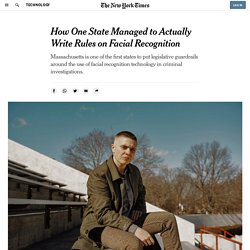
The department could run searches for police only with a search warrant. (A warrant is required under a Washington state law that also takes effect in July.) But Massachusetts’ Republican governor, Charlie Baker, threatened to veto the measure. Www.journaldunet. Drones used by police to monitor political protests in England. Police have used unmanned drones to monitor political protests, including those held by the non-violent Black Lives Matter movement, research shows.

Police also used drones in 2020 at animal rights protests, Extinction Rebellion and anti-HS2 demonstrations, and in one instance, an extreme-right protest. Campaigners say the police’s expanded use of drones is happening with the rules not clear and next to no debate. Police say that is not the case. The campaign group Drone watch used freedom of information requests to ask police forces to detail their use of drones at protests from January to October 2020. The Surrey, Cleveland, Staffordshire, Gloucestershire and West Midlands forces said they had used drones at BLM protests. In south-west England, the Devon and Cornwall force and Avon and Somerset police used drones at 15 events including protests and public disorder incidents. The use of drones in the UK is set to expand, and not just by the police.
Facial Recognition technologies – DataRainbow. And their threats to fundamental human rights and security Leaked EU documents were intercepted by Euractiv journalist Samuel Stolton who published and article “LEAK: Commission considers facial recognition ban in AI ‘white paper’.
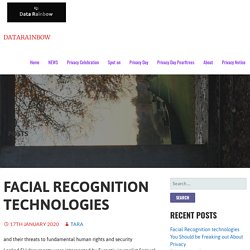
The EU Commission white paper suggests a temporary ban of 3 to 5 years on facial recognition in public spaces. Reminding this could provoke a serious conflict between The EU_Commission and certain member states – such as France and Germany having already taken different positions.
IN SCHOOLS. AMAZON. FR in recruitment. IN U.K. CALL FOR REGULATION. IN CHINA. READING EMOTIONS. Clearview. Facial recognition. FR low accuracy. Facial Recognition. Facial recognition. LEAK: Commission considers facial recognition ban in AI ‘white paper’ The European Commission is considering measures to impose a temporary ban on facial recognition technologies used by both public and private actors, according to a draft white paper on Artificial Intelligence obtained by EURACTIV.
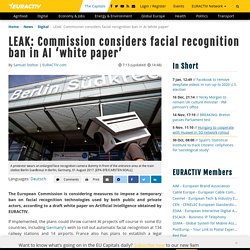
If implemented, the plans could throw current AI projects off course in some EU countries, including Germany’s wish to roll out automatic facial recognition at 134 railway stations and 14 airports. France also has plans to establish a legal framework permitting video surveillance systems to be embedded with facial recognition technologies. The Commission paper, which gives an insight into proposals for a European approach to Artificial Intelligence, stipulates that a future regulatory framework could “include a time–limited ban on the use of facial recognition technology in public spaces.”
Five Regulatory Options for AI The different regulatory branches considered by the Commission in the paper are: Facial-recognition-used-in-public-services-card-programme-department-says-1. The Department of Social Protection has confirmed that it carries out biometric processing and uses facial recognition technologies as part of its controversial public services card (PSC) programme.
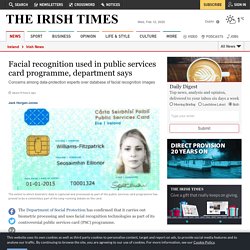
The confirmation prompted concerns among data-protection experts, who said there are questions over the proportionality of creating a database of facial recognition images due to the risks attached. In a revised version of its privacy statement published on Monday night, the department stated that the biometric processing of photographs would be used to identify cases of welfare fraud. It said the photographs were processed to produce a template that allows comparison with other images to detect cases of identity theft or double claiming of benefits. The previous version of the privacy statement contained no reference to biometric processing. Reconnaître des visages dans une vidéo en s’inspirant de l’analyse de l’ADN. DNA Techniques Could Transform Facial Recognition Technology. The following essay is reprinted with permission from The Conversation, an online publication covering the latest research.
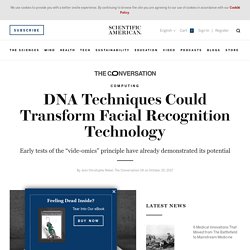
When police in London recently trialled a new facial recognition system, they made a worrying and embarrassing mistake. At the Notting Hill Carnival, the technology made roughly 35 false matches between known suspects and members of the crowd, with one person “erroneously” arrested. Camera-based visual surveillance systems were supposed to deliver a safer and more secure society. But despite decades of development, they are generally not able to handle real-life situations. During the 2011 London riots, for example, facial recognition software contributed to just one arrest out of the 4,962 that took place. Facial recognition and fundamental rights 101. By Ella Jakubowska This is the first post in a series about the fundamental rights impacts of facial recognition.

Private companies and governments worldwide are already experimenting with facial recognition technology. Individuals, lawmakers, developers – and everyone in between – should be aware of the rise of facial recognition, and the risks it poses to rights to privacy, freedom, democracy and non-discrimination. Portland's facial recognition ban could be the strictest yet. NYC councilman Ritchie Torres takes on face recognition. Swedish DPA authorizes police to use facial recognition. Artificial Intelligence Experts Issue Urgent Warning Against Facial Scanning ... Facial recognition has quickly shifted from techno-novelty to fact of life for many, with millions around the world at least willing to put up with their faces scanned by software at the airport, their iPhones, or Facebook’s server farms.
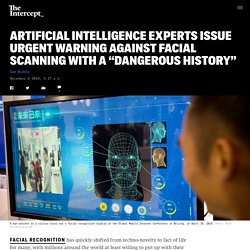
But researchers at New York University’s AI Now Institute have issued a strong warning against not only ubiquitous facial recognition, but its more sinister cousin: so-called affect recognition, technology that claims it can find hidden meaning in the shape of your nose, the contours of your mouth, and the way you smile. If that sounds like something dredged up from the 19th century, that’s because it sort of is. Buzzfeednews. - The Washington Post. Why Tech Employees Are Rebelling Against Their Bosses. Www.wired. Gizmodo. Smile, Your Face Is Now in a Database – Benjamin Powers. A crucial step has been added to international travel.
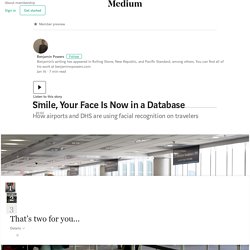
If you aren’t a U.S. citizen, you might need more than just your documents in these 10 airports: Hartsfield-Jackson in Atlanta, Logan in Boston, O’Hare in Chicago, Hobby and George Bush in Houston, McCarran in Las Vegas, Miami International, John F. Kennedy in New York, and Dulles International Airport in Washington, D.C. As part of Trump’s executive order banning certain Muslims from entering the United States, the Department of Homeland Security (DHS)—specifically U.S.
Customs and Border Protection (CBP)—has ramped up and expanded its Biometric Exit program, which gathers biometric data from international individuals exiting the United States to document and verify that they’ve left. But instead of the fingerprints or document review DHS had been using as biometrics verifiers since 2004, the focus now is on facial recognition.
John Wagner, deputy assistant commissioner at CBP, outlined the program vision in early May. As facial recognition use grows, so do privacy fears. Facebook’s Push for Facial Recognition Prompts Privacy Alarms. Digitaltrends. To Illinois Supreme Court: Protect Biometric Privacy. How activists are fighting back against facial recognition. Smile, you're on camera.

And it may know who you are, without you spilling a word. For the coverage of Prince Harry and Meghan Markle's royal wedding, Sky News in the U.K. knew wedding watchers wanted the names of the famous and somewhat-famous guests walking into St. George's Chapel, in Windsor. They turned to facial recognition technology. As guests sauntered in, the software automatically pegged who they were and popped their names up on the screen. Some academics and activists have misgivings about the software. S Use of Your Data. Microsoft raises alarms about face recognition. Are you looking at me? Welcome to the world of facial recognition. As new technologies develop, it’s worth reminding ourselves that just because we can do something doesn’t mean that we should. Often a new technology can bring plenty of new opportunities to do amazing things, but that doesn’t mean that it cannot also be ripe for abuse. That’s certainly the case with facial recognition technology, where some law enforcement agencies have rushed to build networks of databases of law-abiding people’s faces (perhaps from driving licences or passport information), scouring them to find criminals, but failed to satisfy their legal and statutory requirements to inform the public about what they were doing.
The huge number of CCTV cameras and the growing adoption of police body cameras, which could be combined with facial recognition technology and cellphone tracking, have the potential – argue some – to “redefine the nature of public spaces.” As you can tell by his latest police mugshot, he doesn’t seem to be too pleased to have been caught. German police seek volunteers for facial recognition surveillance. Germany's federal police force has a multitude of different tasks, but casting usually isn't one of them. That changed on Monday, as officers set up a stand in Berlin's Südkreuz subway and commuter rail station in an effort to recruit subjects to help them test out anti-crime facial-recognition software. Volunteers have their photos taken, are equipped with transponders and agree to allow themselves to be tracked in a specially marked section of the station for six months starting on August 1.
In return, they're given thank-you presents - everything from Amazon gift certificates to an Apple Watch for the person who passes through the police surveillance zone most often. It sounds a bit goofy, but officers were able to recruit 44 volunteers on the first morning of casting alone and said that the people they had approached had been quite receptive. Startup: Identifying Dangerous Individuals Using Biometric Face Structure - iHLS.
This post is also available in: עברית (Hebrew) Today, in the 21st century, violence and terror are mightier than ever. This trend has many reasons – from refugee movement and civilian wars to rising living costs all around the world. This state, in which many people’s personal security is damaged, has called upon a new tool to handle anonymous violence, the type that has nothing to do with any organization and is, therefore, hard to foresee. Over the last for years, Faception system has been developed for these needs exactly. “We’ve developed a system that can, using complex algorithms and big data analysis, identify a human’s character based on his face structure with a high percent success rate,” explained the company’s CEO, Shai Gilboa. Galaxy S8 face recognition already defeated with a simple picture.
Samsung just recently took the wraps off its latest flagship, the Galaxy S8. In addition to the super-slim bezels, tall screen, and speedy new Snapdragon 835 (or Exynos 9) processor, the device is also coming with a ton of biometric authentication options. You get a fingerprint reader, iris recognition, and face recognition. With the public's first exposure to the Galaxy S8 happening a few days ago, it was only a matter of time until one of these biometric solutions had some holes poked in it. One of those holes is that Galaxy S8's face recognition can be tricked with a photo. At least this is what a video from Spanish Periscope user Marcianophone purports. Google added a "Face Unlock" system to Android 4.0 back in 2011, and it had the same picture vulnerability that Samsung's solution has today. Real-Time Face Recognition Threatens to Turn Cops’ Body Cameras Into Surveill... Last year, a Russian startup announced that it could scan the faces of people passing by Moscow’s thousands of CCTV cameras and pick out wanted criminals or missing persons.
Unlike much face recognition technology — which runs stills from videos or photographs after the fact — NTechLab’s FindFace algorithm has achieved a feat that once only seemed possible in the science fictional universe of “Minority Report”: It can determine not just who someone is, but where they’ve been, where they’re going, and whether they have an outstanding warrant, immigration detainer, or unpaid traffic ticket. For years, the development of real-time face recognition has been hampered by poor video resolution, the angles of bodies in motion, and limited computing power. But as systems begin to transcend these technical barriers, they are also outpacing the development of policies to constrain them. Police see the appeal. This creepy facial recognition app lets users find strangers on Facebook by t... Laeroport-de-nice-inaugure-un-systeme-de-reconnaissance-faciale-3711596. L'aéroport de Nice commencera lundi à utiliser la reconnaissance faciale pour le contrôle aux frontières, deuxième plateforme aéroportuaire française à s'équiper de la sorte après Aéroports de Paris, a-t-il annoncé lundi.
"Réduire le temps des contrôles". "L'enjeu est évidemment de réduire les temps de contrôles pour nos passagers, sans aucun compromis pour la sécurité", a ainsi expliqué Dominique Thillaud, le président d'Aéroports de la Côte d'Azur, cité dans un communiqué. G facial recognition. FB facial recognition. Alessandro Acquisti FB face recognition. Facial recognition privacy/regulation. Facial recognition privacy/regulation.
Facial recognition performance. Germany ask FB to destroy database. Facial recognition identifies SSN. Iris scanning. Facial recognition software 'sounds like science fiction,' but may affect half of Americans - Home. Thursday October 20, 2016 Next time you're walking down a busy sidewalk, look at the person on your left. Then, look at the person on your right. Next, look up at the security camera mounted on the side of a building. Chances are, that camera can recognize one of the people beside you. And maybe you too. That's a creepy thought. An image from an October, 2016 report called "The Perpetual Line-up" from the Center on Privacy & Technology at Georgetown Law. Memo to the DOJ: Facial Recognition’s Threat to Privacy is Worse Than Anyone Thought. Before all of this ever went down In another place, another town You were just a face in the crowd You were just a face in the crowd Out in the street walking around A face in the crowd-Tom Petty If we don’t speak up now, the days when we can walk around with our heads held high without fear of surveillance are numbered.
Creepy or cool? Snap photos of strangers to find them on social media. Hackers Trick Facial-Recognition Logins With Photos From Facebook (What Else?) 12 pictures that show the complete absurdity of using age software on refugees. On Wednesday, Microsoft told indy100 that the facial recognition used by the Daily Mail and the Express to allege a refugee was overage was never intended to be used for this purpose.
Social media users first noticed the inappropriate use of the software. A spokesperson for the company then told us: Log In. Photo A new report by a think tank at Georgetown University calls for greater oversight in the use of emerging facial recognition software that makes the images of more than 117 million Americans — a disproportionate number of them black — searchable by law enforcement agencies. While the agencies, including the F.B.I., have historically created fingerprint and DNA databases primarily from criminal investigations, many of the photographs scattered among agencies at all levels of government are of law-abiding Americans, according to the report released Tuesday.
Researchers create 3D faces from online photos to defeat face authentication systems. Security researchers continue to find ways around biometric-based security features, including a new attack which can defeat face authentication systems. You might be careful about posting photos of yourself online, either refraining from it or setting the images to private, but your “friends” might post pictures of you online. Plow. La reconnaissance faciale bientôt utilisée en France pour les services publics en ligne ?